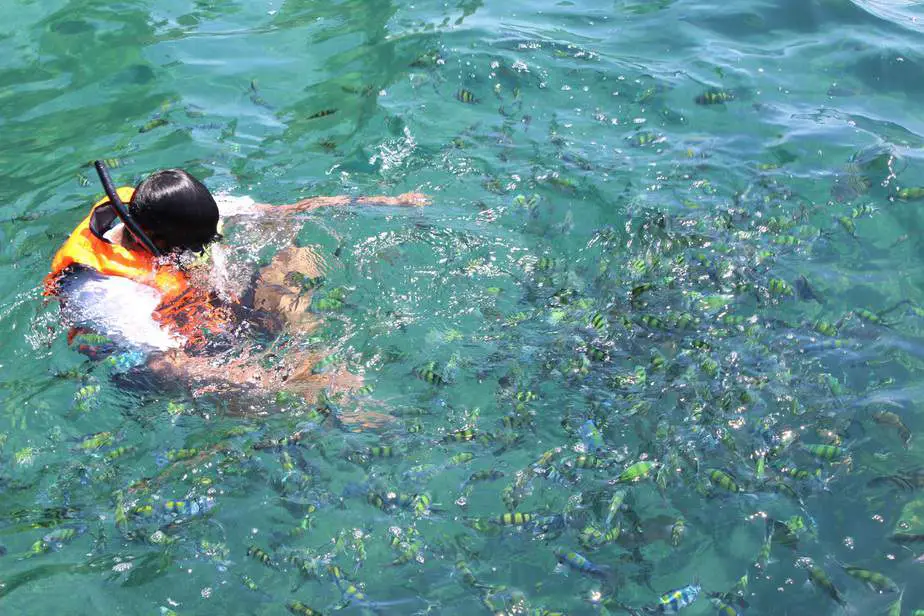If you typically swim in protected areas such as a pool, bay, or lagoon, then you may not realize how much of an impact currents and waves have on your comfort. Specifically, we will be focusing on how the undulating waves can make you feel a little seasick.
Do you feel nauseous during or after snorkeling? This is a common symptom of seasickness, also known as motion sickness. There are many reasons why you might feel motion sickness while out at sea. It could be the choppy boat ride to the snorkel spot, the rough sea conditions when you’re in the water, or possibly something else. There are many possible factors which you will have to figure out through process of elimination.
Thankfully, there are ways you can alleviate this so that you can enjoy snorkeling again in comfort. In this article, we’ll be discussing common causes of nausea while snorkeling, ways to mitigate them, and common questions you might have.
Is nausea while snorkeling caused by seasickness?
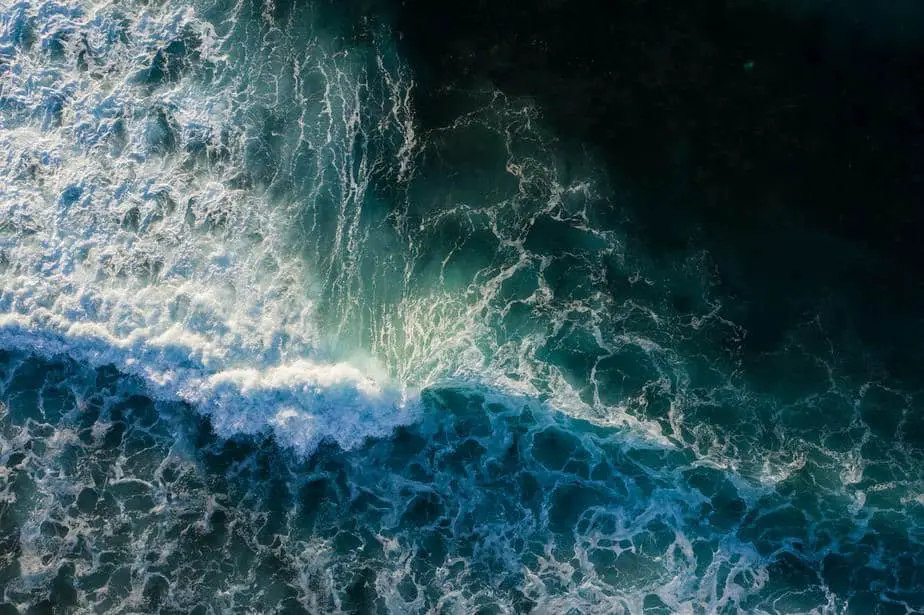
Seasickness, or motion sickness, is the result of when your senses disagree with each other. Classic symptoms of seasickness are dizziness, nausea, and vomiting.
The primary cause is when one’s inner ear, which primarily controls balance, sends signals to one’s brain that contradict what the eyes are perceiving. This mismatch can cause nausea, dizziness, loss of appetite, paleness, headaches, fatigue, and shallow breathing.
Many people have experienced seasickness when riding on a boat with repetitive undulating or pitching movement. The inner ear will feel the up and down or side to side motion and send signals to the brain. The issue occurs when one’s eyes sees something else and tells the brain that the body is moving a different way..
Why does this sensory mismatch cause motion sickness? There is a working theory that the conflicting information confuses the brain and it thinks that a poison has been ingested. Thus, the body will induce vomiting in an attempt to get rid of the poison and restore order.
So how does seasickness affect snorkelers? It’s just like when you’re on a boat. When a snorkeler is floating along the surface, it will be affected by the water’s movements just the same as a boat.
Thus, a snorkeler can feel seasick while snorkeling due to the differences in perceived movement by the inner ear and eyes. There are even more causes of seasickness which we will cover in more detail below.
Who is more likely to get nauseous when snorkeling?
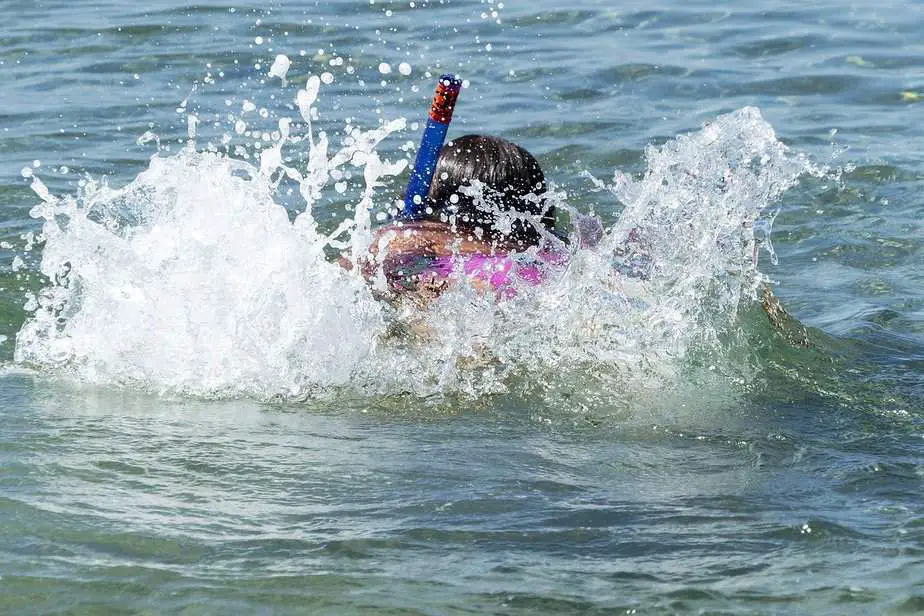
Unfortunately, if you are someone who gets carsick, which is basically the same phenomenon as seasickness, then you won’t fare any better when snorkeling. Why is it that some people feel fine in cars, on boats, and when snorkeling, while others don’t?
Again, the cause is not known. The working theory is that motion sickness might be passed down genetically. Some individuals may simply have more sensitive inner ears that perceive even very fine movement. Thus, the undulating motion is felt more strongly which induces a stronger sense of nausea compared to an average person.
With that said, everyone is susceptible to motion sickness. Some people who are very sensitive to it should probably stick to snorkeling in a pool or lagoon. The sea conditions in open water can be very unpredictable, and you don’t want to end up puking your guts out at sea if you’re sensitive to motion sickness.
Common causes of nausea while snorkeling
Undulating waves
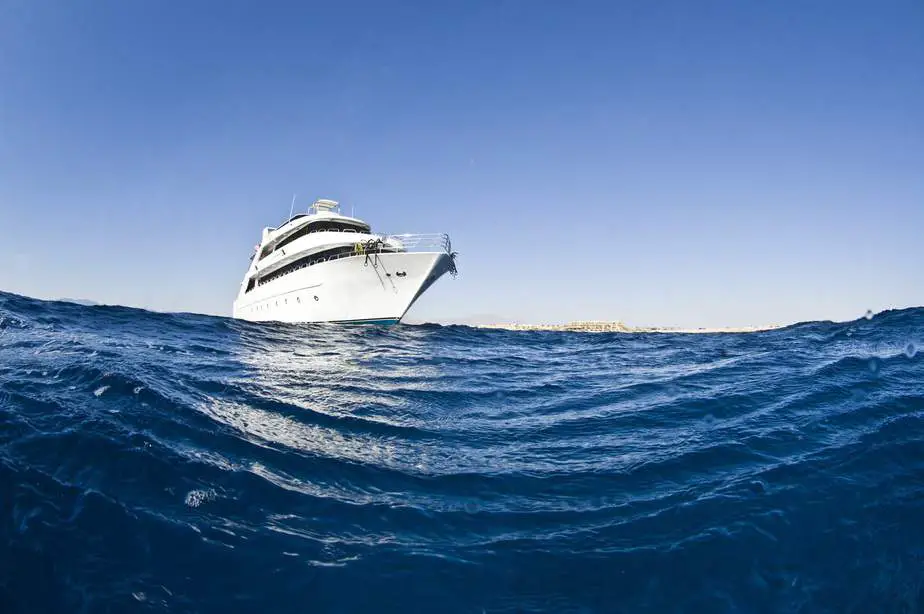
Perhaps you started off snorkeling in calm waters, but as the sea condition changed, now you are floating in water with many waves. The movement can cause you to feel nauseous. In a similar vein, currents, swells, and tides can also cause water movement that your eyes may not notice, but your inner ears will.
As you bop up and down or sway side to side, the inner ear will send signals to your brain regarding your position. If this information is a mismatch from what your eyes are perceiving, you may begin to experience motion sickness. The stronger the water movement, the worse your nausea will be.
Constant head movement
Beginner snorkelers are more likely to move their head around to orient themselves better or to cheek their surroundings. This is a good habit to have generally speaking, however it also makes you more susceptible to motion sickness.
However, this is not something you should change about yourself. It’s a good idea to look around to see that you’re not drifting far away, leaving your dive buddy or group, or floating away from the boat or exit point. Try to utilize your peripheral vision more so you don’t have to move your head as much.
Water pressure affecting the ears
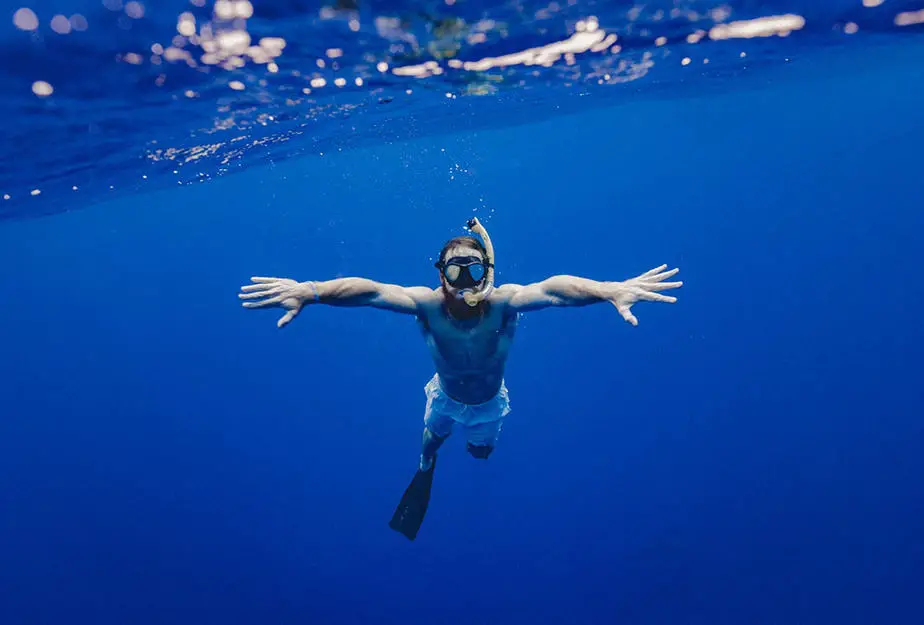
Snorkelers who spend all of their time at the surface won’t experience this problem. Snorkelers who duck dive will be subject to water pressure that will affect their mask, sinuses, and inner ears. As well as movement, the inner ear is sensitive to pressure changes which can send more confusing signals to your brain.
The issue here is when one ear feels a difference in pressure than the other. This can occur if you are having trouble equalizing your ears. Maybe one ear managed to get equalized but not the other.
Another cause of motion sickness can be from water constantly going in and out of your ears, possibly clogging them and. Not only is it uncomfortable, but it can also lead to ear infection and ear pain which is not to be taken lightly.
Improper breathing
The proper way to breathe is to take slow, deep breaths. Sometimes people alter their breathing habits, often to their detriment, such as by breathing too shallow or breathing in too deep.
In the case of breathing in too deep, also known as hyperventilating, is when a snorkeler tries to get extra oxygen into their body before a duck dive. This is dangerous because it can cause you to feel lightheaded and result in shallow water blackouts.
Breathing too shallow is like the opposite of hyperventilating because it allows carbon dioxide to build up, which also leaves you feeling lightheaded.
Acid reflux
Snorkeling too soon after a heavy or spicy meal won’t do you any favors. When you combine the already nauseating effects of the water with a full stomach, it’s almost a certainty that you’ll empty your stomach of its contents.
Plus, a full stomach can cause you to feel sluggish because significant blood flow needs to go to your stomach in order to digest the food. You should generally not be doing any sort of exercise if you’ve eaten recently.
Conversely, on the other extreme where one is dehydrated or hasn’t eaten any food, the snorkeler is no better off than one who has eaten a lot. They may feel lightheaded and dizzy due to a lack of energy, and this is only worsened by the seasickness.
Underwater photography
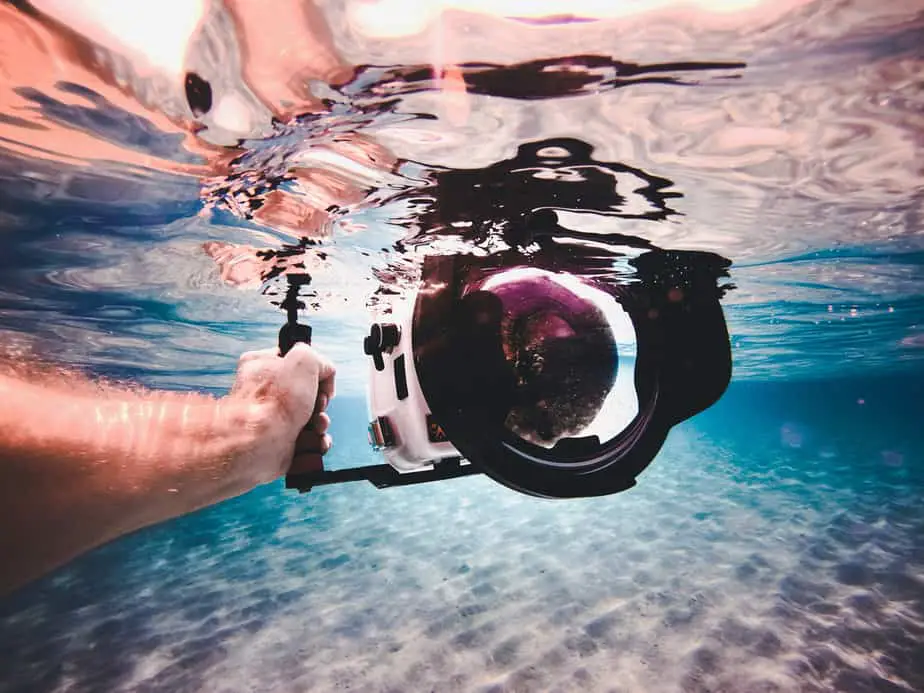
Snorkelers who are also underwater photographers are more likely to feel seasick due to the nature of their work. When taking photos while snorkeling, the snorkeler has many things to keep track of. They have to focus on framing the shot, while battling the waves and ensuring that they aren’t going to collide into anything nor will they drop anything.
It can be difficult to hold a camera while snorkeling due to all of these factors to be wary of. Since the photographer’s eyes will be so focused on the subject of the photo, while the background is moving as they are bobbing around in the water, it can make it a nightmare for the brain to process all of this information.
Nervousness
Someone who is anxious about snorkeling, perhaps due to inexperience or fear, can also feel sick similar to being seasick. The uncomfortable feeling they are experiencing would then be interpreted as being seasick.
If you’re feeling nervous, you should NOT be snorkeling from a boat or in open water. We recommend snorkeling in a protected area first such as a lagoon or swimming pool. Here, you can practice the basics until you don’t feel as nervous anymore.
How to alleviate nausea when snorkeling
Motion sickness medication

If you know you’re prone to seasickness, then you should consider taking some motion sickness medication before you head into the water.
Read the medication label carefully and follow the instructions exactly as they say. Some medication needs to be taken a day or two in advance, so taking it the day of or even just prior to heading out may not be effective.
Also pay close attention to the potential side effects that the medication can cause. Some motion sickness treatments can cause drowsiness that you want to avoid.
As an aside, if you’re taking any other medications, you should probably consider asking a doctor if there are any contraindications between your medications.
If you believe in acupuncture, then many people claim that wearing preventative wristbands that targets specific acupressure points can prevent nausea.
For extreme seasickness, then prescription-only patches may be a solution, though you’d need a doctor to prescribe them to you.
Lastly, if you suffer from acid reflux, then take some antacids prior to getting into the water.
Natural remedies

I put natural remedies in the same category as acupuncture under “things that people say works but are not necessarily backed by science.” Some people swear by natural remedies. Other people resort to them so as not to take any unnecessary medication.
Ginger pills, ginger sweets, or natural ginger are claimed to help alleviate nausea. The reasoning is that ginger contains chemicals that may relax the digestive system, which some snorkelers claim has helped them deal with motion sickness.
Some people claim that sniffing natural peppermint oil or sucking on peppermint candy has nausea-alleviating effects as well. You’ll have to experiment with them to determine how much works for you, if at all.
Also, be very careful about allergies you might have with them.
Stay hydrated and eat the right foods

This point seems to contradict what we said earlier about not eating too much or too little food. The thing is, there’s certainly a sweet spot.
Dehydration is an issue that snorkelers have to deal with. It’s actually very easy to become dehydrated even if you’ve been drinking fluids. First, alcohol, coffee, tea, cola, and simply being in cold water are known to be diuretic, meaning they make you want to pee.
You can’t do anything about immersion diuresis, which is a natural phenomenon in our body that increases urine production in cold water. However, you can certainly avoid certain drinks which will end up dehydrating you in the long run.
Stick to just water, fruit juices, or energy drinks. Even though snorkeling is typically relaxing, the cool feeling of water may make you forget that you are actually dehydrating. You can also lose water from sweat which you will be doing a lot of if you are very active in the water.
Additionally, you should eat something before going snorkeling. Just make sure it’s a light meal and that you do it 2-3 hours before getting on the boat or into the water.
Don’t eat anything “heavy” such as steak. Avoid greasy, acidic, or spicy foods as well. Stick to eating grains, fruits, and vegetables.
The point of this meal is to give you energy for your snorkeling session 2-3 hours later. It should not be a large meal, because undigested food in your stomach while exercising can cause you to feel unwell.
Boat tips to avoid nausea
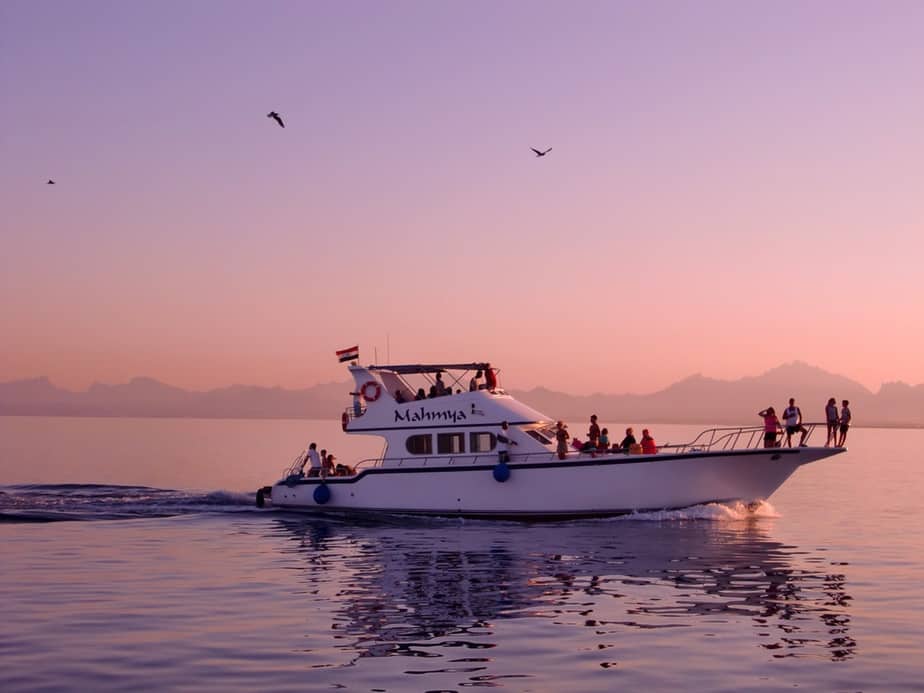
Some people feel nauseous on the ride to the snorkel site. That said, most people feel much better once they are off the boat and snorkeling in the water, so at least things will get better. There are some things you can do to make the boat ride bearable so that you can start your snorkeling session feeling good.
First, try to book your snorkel trips on larger vessels. Larger vessels, due to their large size, don’t feel like they are impacted as much by the water compared to smaller ones. If you’re in a smaller boat, hopefully you took some motion sickness medicine because it’s going to be a choppy ride.
Next, if the boat has a lower deck, we recommend not going there. The best thing you can do is to stay outside and see the natural world around you. When you cannot see that you are moving rapidly but your inner ear can feel it, then that’s when you can start to feel dizzy. Staying outside also lets you breathe fresh air which is always a good thing.
While you’re outside, we recommend keeping your eyes trained on the horizon. By having your eyes focused on a non-moving visual reference, you can more easily perceive all of the movement going on around you which helps your brain make sense of what’s happening. This may reduce your nausea.
Next, try to find the most stable position on the boat. This can differ from boat to boat, and it also depends on the sea conditions. For most boats, the most stable area is directly in the middle, but it could also be at the stern.
The worst areas to be on the boat are generally the bow or any area that is high up where the most dramatic movements will take place. If you aren’t sure where to go , you can try asking the boat crew where the best place for a seasick person to rest is.
When you’re nauseous, you already feel like vomiting. Don’t make it worse by moving around too much or inhaling odorous smells like cigarette smoke, the bathroom stink, or engine fumes. You can also try standing so you can counterbalance the ship’s movement which can help prevent the feeling of nausea from worsening.
Wear earplugs
Swimmer’s earplugs can help prevent motion sickness when you’re snorkeling and swimming. They prevent water from splashing in and out of the ear which can be disorienting and uncomfortable.
The main benefit of swimmer’s earplugs is to prevent swimmer’s ear, which is a type of ear infection caused by the bacteria in the water multiplying due to the moist environment. By keeping water out, you can prevent both nausea and swimmer’s ear.
Keep in mind that swimmer’s earplugs are different from regular ear plugs. They are specifically designed to fit tightly in your ears, to be waterproof, and to be highly durable. They can be washed and reused over and over again, so you are getting good bang for your buck.
If you plan on duck diving, then you specifically need vented ear plugs. Vented ear plugs have a small vent that allows equalization to occur while preventing debris from entering. Swimmer’s earplugs are not vented, which means that you can run into equalization problems when duck diving.
Snorkel in a sheltered area

You can drastically reduce or prevent feelings of nausea if you stick to snorkeling in calm waters. Now obviously one cannot control sea conditions, otherwise it would be calm all the time. However, what is within your power to control is where you decide to snorkel.
If you’re prone to seasickness, perhaps you should avoid open water snorkeling and try snorkeling in a bay or lagoon where there are natural protections against currents, waves, and swell.
In a similar vein, snorkeling in shallow water can also help with nausea. Since you are so close to the sea floor, it’s much easier to visually orient yourself relative to your surroundings. Plus, at any point you can simply stand up or exit the water if your seasickness is getting worse.
Breathe deep and slow
When you’re nervous, you are more likely to perform rapid, shallow breaths. This is not ideal. You must always try to breathe in deeply and slowly. This is the best way to get the oxygen you need and to stay calm. Shallow breathing encourages carbon dioxide build-up that can make you feel lightheaded and dizzy which adds to the feeling of nausea.
Some snorkelers are able to breathe deeply and slowly by counting slowly. They may do a 3-second inhale and 3-second exhale to ensure that they are getting the oxygen they need and fully clearing out the snorkel of dead air. This is also a very calming cadence to breathe in.
Check the forecast
If you aren’t sure whether weather conditions will hold up, you need to do some research about the local sea and weather conditions. Certain areas, depending on the time of the day, may also suffer from rough waters.
You can ask locals, or better yet, you can ask a dive shop employee for advice. The locals will know the area better than you and can give you their opinions on whether they still recommend heading out or not. Additionally, you may need to time your trip to avoid when there are significant tidal movements.
In this section, we have covered various ways you can prevent getting nauseous. However, if all else fails, then the least you can do is to try snorkeling in shallow, calmer waters.
How do I deal with nausea while snorkeling
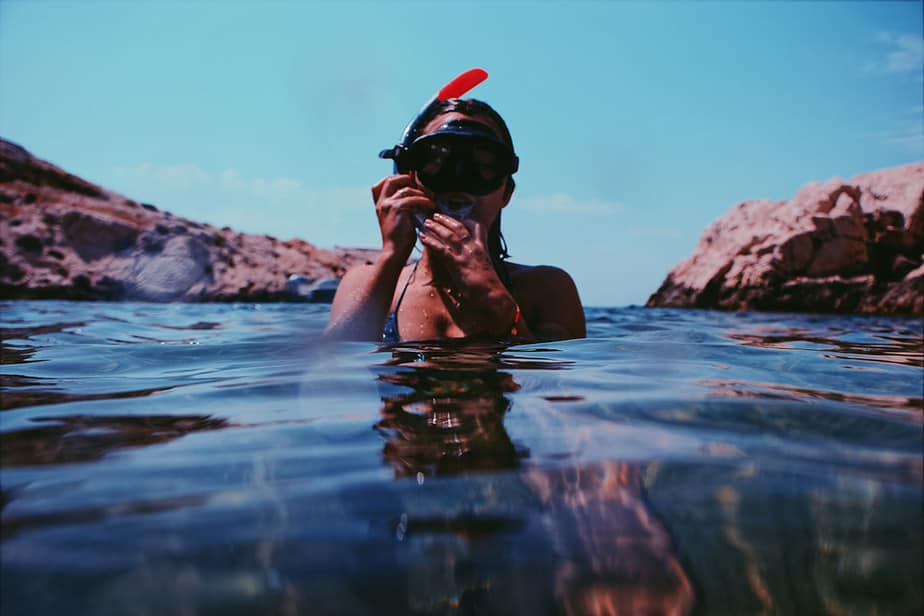
So you’re in the middle of snorkeling and suddenly you’re feeling nauseous. What do you do?
The first thing to do is to get yourself in a vertical position. You want to get your ears out of the water. If you’re in shallow water, stand up. If you’re in deep water, hopefully you have a flotation device to help you stay buoyant as you get your bearings.
Next, cast your eyes to the horizon or towards land. Once you have your eyes locked onto a fixed location, then it can help your brain figure out your body’s motion due to the waves. Breathe slowly and deeply all the while.
If you don’t feel better, then you should end your snorkeling session. Make your way back to the boat or the exit point, hopefully with some assistance from your snorkeling buddy.
Is it okay to throw up while snorkeling?
Well, if you gotta go, then you gotta go. Hopefully you can hold it in long enough to remove your snorkel. Try to reach a vertical position as quickly as possible so that your mouth is above the water’s surface.
If waves are buffeting you, then turn your back to the waves so you don’t end up choking on water and vomit. When you’re puking, you are temporarily unable to breathe and having water splashed in your face meanwhile is a serious drowning/asphyxiation risk.
At this point, you shouldn’t worry about being polite. Make as big of a mess as you need to, just make sure your head is above water and that you don’t inhale seawater. Afterwards, have your buddy assist you back to the boat or exit point.
Can I feel nauseous after snorkeling?
Yes, sometimes people feel dizzy or nauseous after exiting the water. This can be from your brain getting too used to the movement of the water and finding it confusing to suddenly be on solid ground. There will be an adjustment period until you’re back to normal.
The cause may also be from water or congestion in the ears which is affecting your sense of balance. We recommend using ear drops for watersports to help evaporate the water in your ears after a day in the water. This can also help prevent ear infection.
If you are feeling unsteady, continue following the advice of fixating on the horizon and keeping hydrated until you’re feeling better.
If I’ve gotten seasick before, will I get it again?
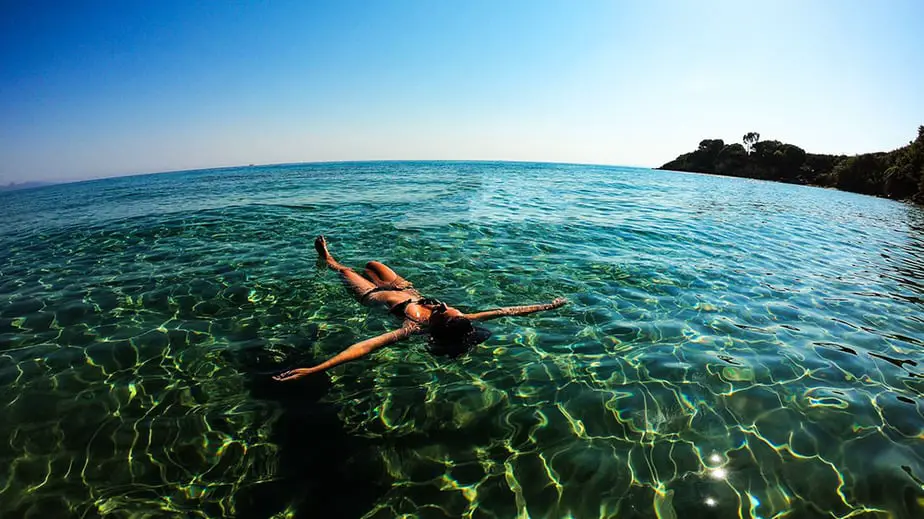
Unfortunately, the answer is most likely yes. If you experience seasickness even under ideal conditions, then you seem to be prone to it. However, if the conditions were particularly rough the last time you felt seasick, then it may just be due to the extreme conditions.
However, hope is not lost. If you’re willing to be a bit of a scientist, you can experiment with using motion sickness medication or herbal remedies. Follow the advice provided in this article and see if they work for you.
It’s possible that you can figure out a “method” that you specifically designed to avoid feeling nauseous. It may or may not work for others, but as long as it works for you, then keep on doing it. Perhaps you will be able to find a suitable workaround that isn’t too complicated or costly.
Is it normal to feel nauseous on boat trips?
It seems like on every other boat trip, there will be an excited newbie who is not experienced with the ocean feeling under the weather from the turbulent boat ride.
Some excursion operators are eager to take their guests to the best snorkeling spots and the sea conditions there may not be necessarily ideal. Plus, first time snorkelers who have not prepared any measures to prevent motion sickness will be in for a rude awakening. All of these factors combine together to make seasickness a common phenomenon.
Follow our advice and either make the necessary precautions to prevent seasickness on a boat trip, or stay in shallow, calm waters. If it looks like someone is turning green and is about to heave, we recommend staying away from them.
Parting words
Unfortunately, feeling nauseous when snorkeling is a relatively common ailment which affects many beginners.
There are many reasons why one might feel nauseous, and you will have to play detective and rule out the reasons one by one until you figure out which one is most affecting you.
If you are predisposed to motion sickness, then you should consider taking motion sickness medication in advance of your trip.
You can also consider natural remedies, though the effectiveness of naturopathic remedies are often called into question. As long as you’re not using it to treat a serious condition, then it’s worth a shot because at the very least you may get some placebo benefits.
Stay hydrated and eat a small meal 2-3 hours before snorkeling to provide fuel for your body. Make sure to avoid alcohol or any heavy meals (e.g. steak) until after you finish snorkeling.
Ask the locals or a dive shop employee for advice on sea conditions, particularly if you’ll be heading off on a boat. The more rough the sea conditions are, the more likely you’ll feel nauseous.
Consider snorkeling in shallow water if you’re prone to feeling seasick. If you start to feel nauseous, fixate your eyes on something stationary in the distance, such as land or the horizon. This can help your brain get a sense of how your body is moving, which may help with the nausea.
Motion sickness is quite common and can affect everyone. So if you do start to feel nauseous, don’t feel guilty as if you’re the only person it’s affecting. Try not to worry about it too much and follow the advice provided in this article to feel better.
Lastly, enjoy your time snorkeling. It’s a safe and fun hobby that’s not too difficult. Even if your first time snorkeling experience isn’t the greatest, give it another shot some time in the future. You won’t regret it!
Last update on 2024-07-14 / Affiliate links / Images from Amazon Product Advertising API

